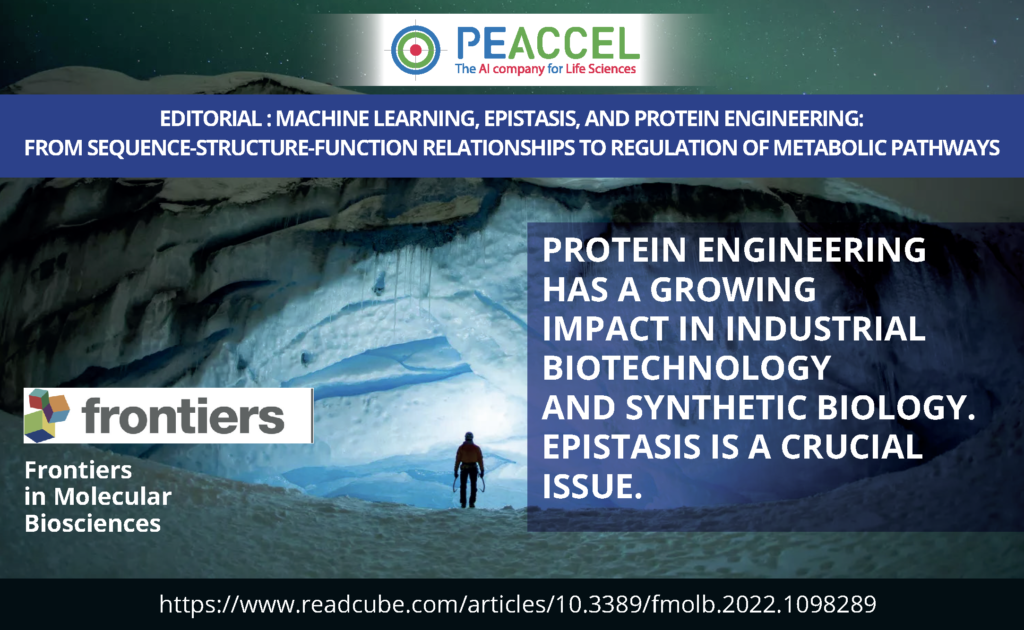
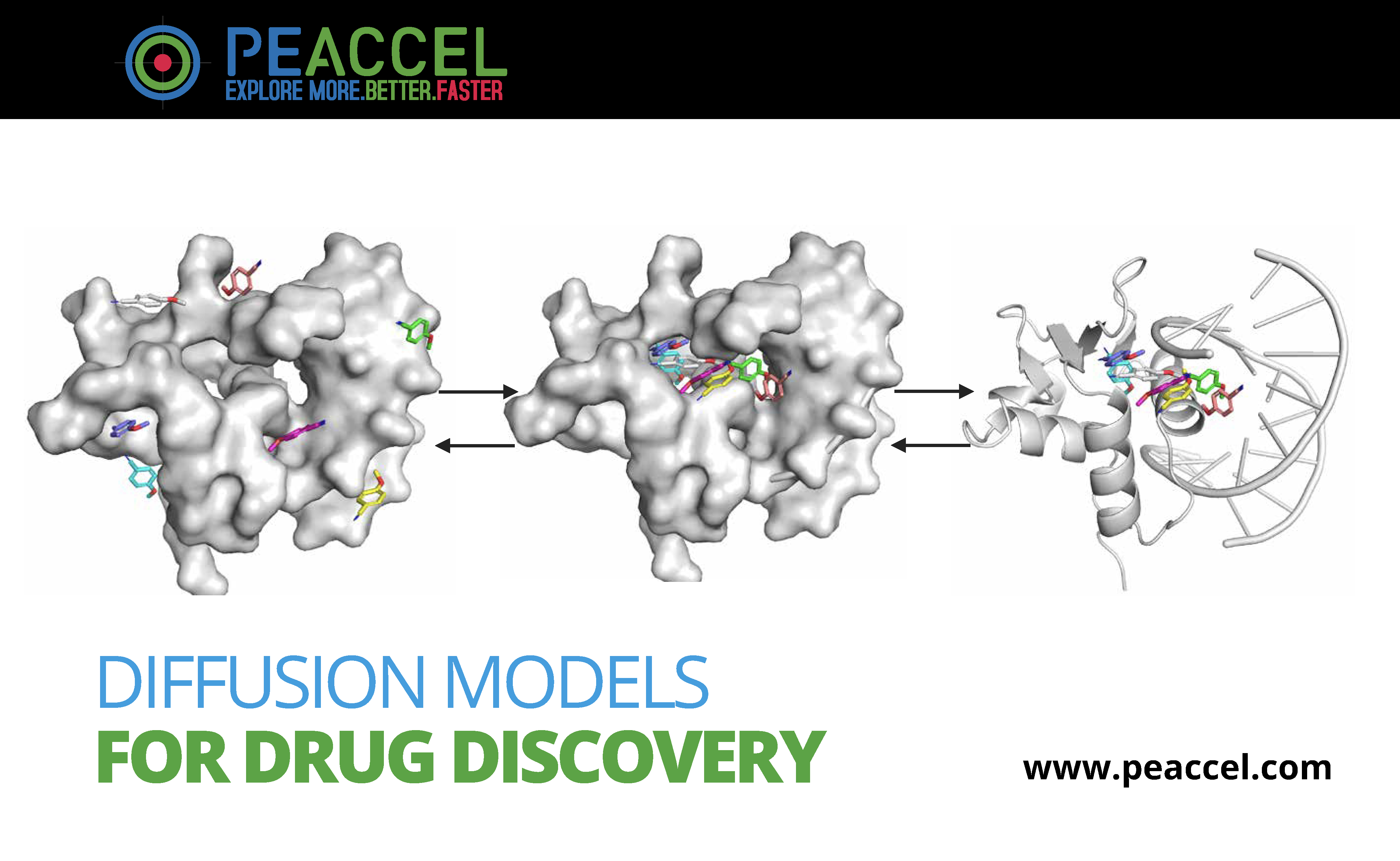
Diffusion Models for Drug Discovery
21 January 2025
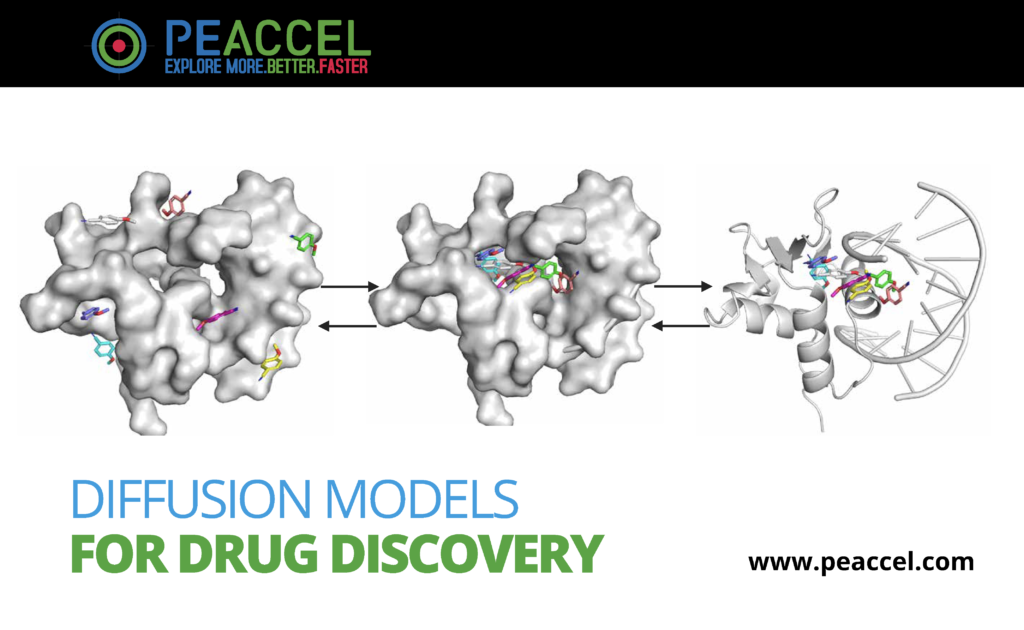
🌐PEACCEL at the Cutting Edge of Biopharmaceutical Innovation: Generative AI, Diffusion Models, and Quantum Computing
🔬 PEACCEL unveiled its latest research on Diffusion Models in drug design, providing an in-depth analysis of 56 cutting-edge models and their interconnections. These models, including Score-based Generative Models (SGM) and Denoising Diffusion Probabilistic Models (DDPM), are revolutionizing the design of proteins, peptides, and small molecules. We critically examine the role of E(3) and SE(3) equivariance and symmetry in advancing these methodologies.
PEACCEL’s pioneering work positions it as a leader at the forefront of technology, combining the transformative power of Generative AI, Diffusion Models, and Quantum Computing. These advancements are unlocking unprecedented opportunities for pharmaceutical companies and venture capitalists eager to invest in the next wave of biopharmaceutical breakthroughs.
🤝 For partnerships or investment opportunities, connect with PEACCEL and be part of the future of healthcare innovation.
For more information: https://arxiv.org/abs/2501.02680
PEACCEL
Making the world disease free
Contact: AI-team@peaccel.com
http://www.peaccel.com/

PEACCEL – Shaping the Future of Quantum Pharma™
17 December 2024

🌐 PEACCEL’s Quantum Breakthrough in Biopharmaceutical Discovery Published in Quantum Information Processing (Springer Nature).
We’re thrilled to announce that our pioneering research paper on Quantum Computing for biologics has been published in Quantum Information Processing! This milestone marks a significant leap forward in pharmaceutical discovery, showcasing the transformative potential of Quantum Machine Learning (QML) in real-world applications.
🧬 The Quantum Leap for Biologics Development
We applied Quantum Support Vector Machine (up to 14 qubits) to classify peptides as hemolytic or non-hemolytic—a critical task with life-saving implications.
Our work paves the way for faster, safer, and more effective biologics, transforming patient care worldwide.
🔍 Collaborative Excellence
This groundbreaking work was conducted in collaboration with the University of Western Australia’s Quantum Physics and Computing team, under the leadership of Prof. Jingbo Wang.
For more information: https://doi.org/10.1007/s11128-024-04540-5
PEACCEL
Making the world disease free
Contact: AI-team@peaccel.com
http://www.peaccel.com/
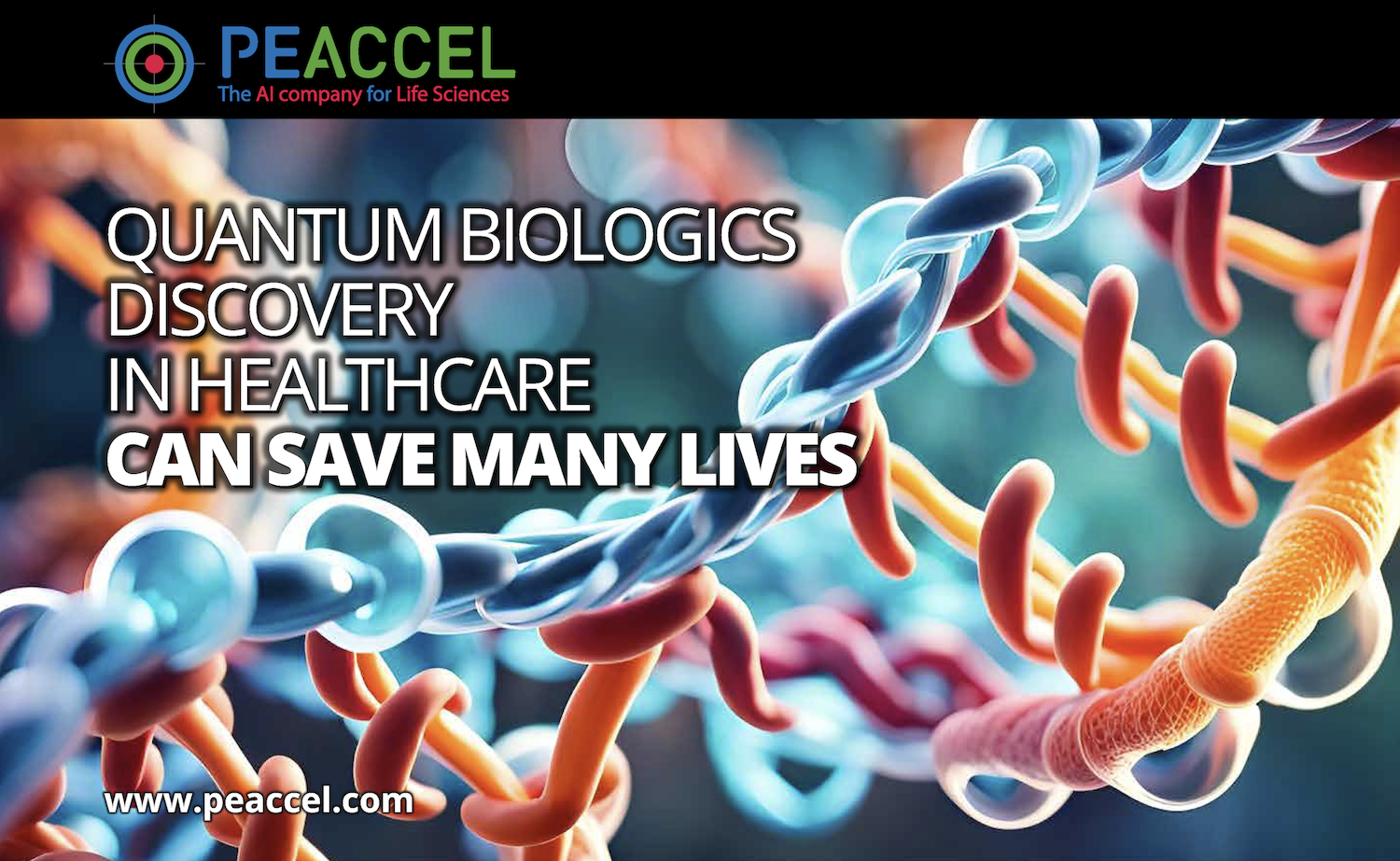
Quantum biologics discovery in healthcare can save many lives
4 April 2024
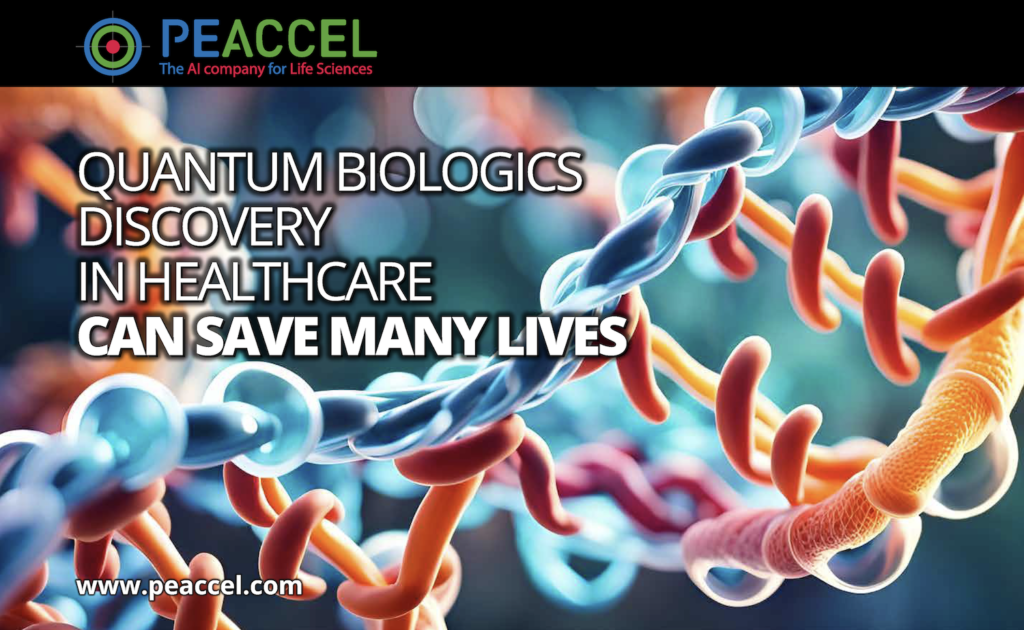
We're thrilled to announce PEACCEL's pioneering paper in the realm of Quantum Computing for biologics, marking a significant leap forward in pharmaceutical discovery. Our cutting-edge research, conducted in collaboration with the University of Western Australia's esteemed Quantum Physics and Computing team - Shengxin Zhuang, John Tanner, Yusen Wu, under the great leadership of Prof Jingbo Wang, Ass. Prof Du Huynh, and Ass. Prof Weil Liu - demonstrates the untapped potential of Quantum Machine Learning (QML) in the biopharmaceutical industry.
🌐 Quantum Advantages in Computational Biology 🌐
This research underlines the significant, yet largely untapped, advantages of quantum computing in the field of computational biology. By demonstrating that QSVM can exceed the performance of classical machine learning models, we provide empirical evidence and hope for quantum advantages in real-world applications, particularly in developing safer therapeutic solutions.
🔬 Why This Matters for Pharma 🔬
In our study, we applied the quantum support vector machine (QSVM, up to 14 Qubits) to a crucial task: classifying peptides as either hemolytic or non-hemolytic. According to the French national health database, 160 drugs have been shown to induce autoimmune hemolytic anemia for the period 2012-2018, and 3,371 cases of Drug Induce Autoimmune Hemolytic anemia (DI-AIHA) were recorded (https://doi.org/10.1182/blood-2022-157730). 1% wrong class assignment means more human deaths by hemolysis. A 1% gain in accuracy in healthcare can save many lives.
The implications of this work for the pharmaceutical industry are profound. We can harness the quantum leap to expedite the development of novel biologics and transform patient care worldwide.
For more information: https://arxiv.org/abs/2402.03847
PEACCEL
Making the world disease free
Contact: AI-team@peaccel.com
http://www.peaccel.com/

Revolutionizing Biologics Drug Discovery with AI: A Leap Forward with PEACCEL and Google Cloud
8 March 2024

We're thrilled to share an exciting milestone at PEACCEL - our disruptive AI discovery platform for biologics is setting new benchmarks in the pharmaceutical industry. By unlocking previously inaccessible spaces, we are identifying novel, life-changing drugs that were only possible in nature 1% of the time. Imagine the potential when we can screen 1 billion molecules in a single day!
🌐 A Game-Changing Collaboration: PEACCEL & Google Cloud 🌐
Our journey has taken an exhilarating turn as we were handpicked to join the Google Startup Program. This collaboration is not just an endorsement of our innovative approach; it's a catalyst for exponential growth and impact. Here's what this means for the pharmaceutical industry:
- Massive Scale Screening: From millions to over a billion molecules per day, pushing the boundaries of drug candidate identification from good to the BEST.
- Industrial Scale AI: Our platform's scalability is now supercharged, ready for real-world applications at an industrial level.
- Unprecedented Computing Power: Access to a vast array of GPUs, expanding our computing capacity to accelerate drug development, reduce costs, and bring life-saving treatments to market faster.
- Robust Infrastructure & Tools: Leveraging Google's state-of-the-art technology to enhance our research capabilities, foster innovation and drive forward the future of drug discovery.
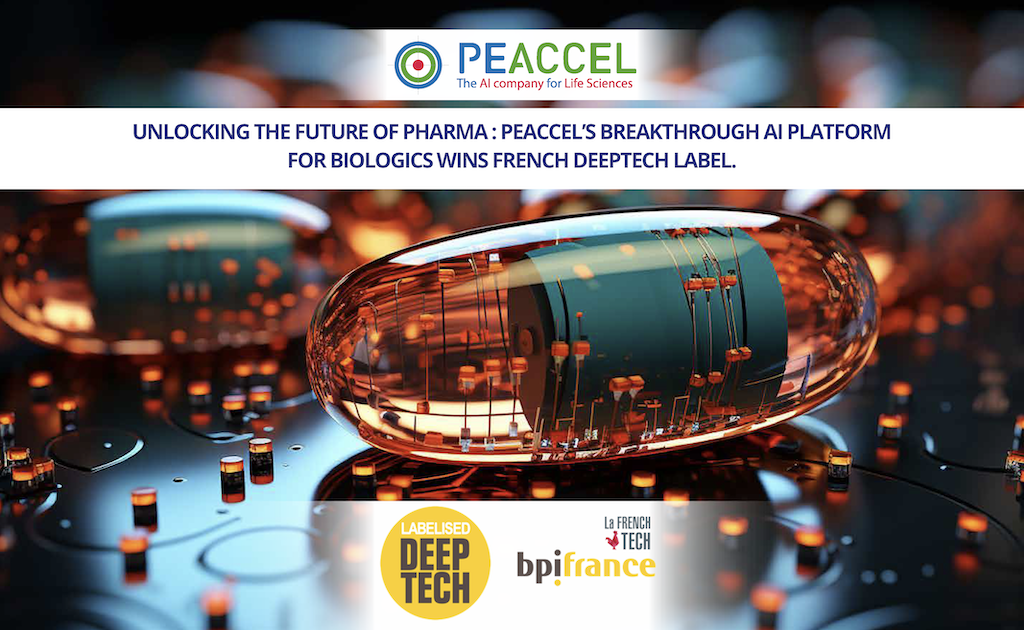
Unlocking the Future of Pharma: PEACCEL’s Breakthrough AI Platform for Biologics Wins French DeepTech Label.
29 February 2024

We are thrilled to announce that PEACCEL has been awarded the prestigious French DeepTech label by BPI France, the public investment bank dedicated to innovation. This recognition is a testament to our commitment to pushing the boundaries of biotechnology with our groundbreaking AI discovery platform for Biologics.
(more…)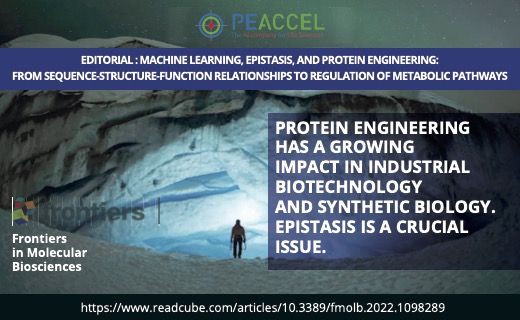
Epistasis is a crucial issue: Non-Linear responses can hinder drug target identification or optimization of industrial production processes
15 December 2022
Protein engineering in the context of metabolic engineering has a growing impact in industrial biotechnology and synthetic biology. Epistasis is a crucial issue: Non-Linear responses can hinder drug target identification or optimization of industrial production processes.
Discover our Editorial for a special issue of Frontiers in Molecular Biosciences: Machine learning, epistasis, and protein engineering: From sequence-structure-function relationships to regulation of metabolic pathways VOL I.
Read more: https://www.readcube.com/articles/10.3389/fmolb.2022.1098289
For more information:
PEACCEL
Making the world disease free
Contact: AI-team@peaccel.com
http://www.peaccel.com/
